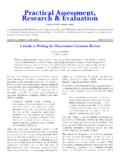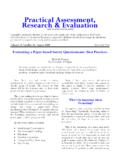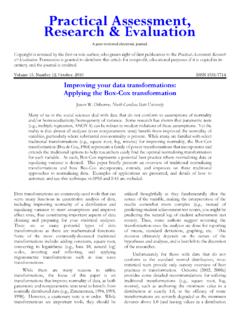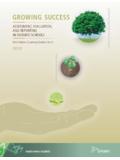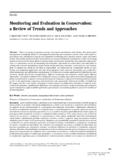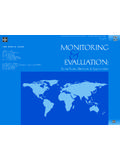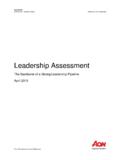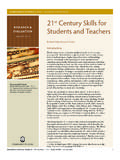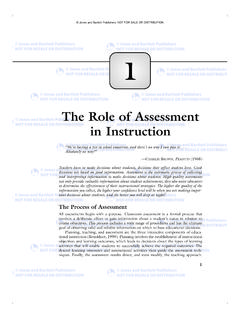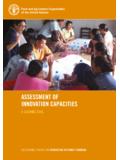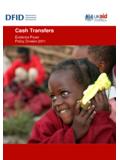Transcription of A Critical Review of Research on Formative …
1 A peer-reviewed electronic journal. Copyright is retained by the first or sole author, who grants right of first publication to the Practical assessment , Research & evaluation . Permission is granted to distribute this article for nonprofit, educational purposes if it is copied in its entirety and the journal is 14, Number 7, March 2009 ISSN 1531-7714 A Critical Review of Research on Formative assessment : The Limited Scientific Evidence of the Impact of Formative assessment in Education Karee E. Dunn & Sean W. Mulvenon University of Arkansas The existence of a plethora of empirical evidence documenting the improvement of educational outcomes through the use of Formative assessment is conventional wisdom within education.
2 In reality, a limited body of scientifically based empirical evidence exists to support that Formative assessment directly contributes to positive educational outcomes. The use of Formative assessments, or other diagnostic efforts within classrooms, provides information that should help facilitate improved pedagogical practices and instructional outcomes. However, a Review of the Formative assessment literature revealed that there is no agreed upon lexicon with regard to Formative assessment and suspect methodological approaches in the efforts to demonstrate positive effects that could be attributed to Formative assessments. Thus, the purpose of this article was two-fold. First, the authors set out to clarify the terminology related to Formative assessment and its usage.
3 Finally, the article provides a Critical analysis of the seminal literature on Formative assessment , beginning with Black and Wiliam (1998), and extending through current published materials. The implementation of No Child Left Behind (NCLB) in 2002, and subsequent sanctions for lower performing school systems, has led to a myriad of educational interventions to improve student achievement. A common method advocated to improve student achievement is the use of Formative assessments, both to improve the pedagogical practices of teachers and to provide specific instructional support for lower performing students. An almost unchallenged belief in education is that Research has conclusively demonstrated that the use of Formative assessment facilitates improvement in instructional practices, identifies gaps in the curriculum, and contributes to increased student performance.
4 However, as part of a series of studies being designed to evaluate the assessment and methodological practices used in data driven decision-making, a Review of the literature revealed limited empirical evidence demonstrating that the use of Formative assessments in the classroom directly resulted in marked changes in educational outcomes. Basically, what began as a perfunctory Review of literature on Formative assessments for a manuscript on statistical methods, evolved into a Critical analysis of both the operationalization of Formative assessment and the methods employed to document the impact of Formative assessments.
5 It is difficult to hypothesize, and somewhat irresponsible to conclude that the use of Formative assessments does not provide information to help improve instructional practices or student outcomes in classrooms. This manuscript provides a Critical examination of the Formative assessment literature in particular issues related to the Formative assessment lexicon, Black and Wiliam s (1998) seminal work, and more recent Research . Finally, this manuscript provides the foundation for a series of manuscripts on best practices for evaluating student achievement through the use of Formative assessment . Practical assessment , Research & evaluation , Vol 14, No 7 Page 2 Dunn and Mulvenon, Formative Assessments Review of the Literature Over the past several years, a growing emphasis on the use of Formative assessment has emerged, yet Formative assessment has remained an enigma in the literature (Black & Wiliam, 1998; Leung & Mohan, 2004).
6 When reading Formative assessment literature and focusing on the issue of solidifying a definition of the term, an interesting and problematic theme arose. Formative assessment and its various manifestations ( self- assessment , peer- assessment , and interim assessment ) were defined not only by inherent characteristics, but also by the use of the assessment . Formative assessment s status as an ethereal construct has further been perpetuated in the literature due to the lack of an agreed upon definition. The vagueness of the constitutive and operational definitions directly contributes to the weaknesses found in the related Research and dearth of empirical evidence identifying best practices related to Formative assessment .
7 Without a clear understanding of what is being studied, empirical evidence supporting Formative evidence will more than likely remain in short supply. For example, Black and Wiliam (1998) defined Formative assessment as all those activities undertaken by teachers, and/or by their students, which provide information to be used as feedback to modify the teaching and learning activities in which they are engaged (p. 10). Where as, the Council of Chief State School Officers (CCSSO) defined Formative assessment differently according to the specifications provided by Formative assessment for Students and Teachers (FAST), a department of CCSSO. FAST defined Formative assessment as a process used during instruction to provide feedback for the adjustment of ongoing teaching and learning for the purposes of improving student achievement related to instructional objectives (Melmer, Burmaster, & James, 2008).
8 In 2006, Popham stated that an assessment is Formative to the degree that the information collected from the assessment is used during the assessed instruction period to improve instruction to meet the needs of the students assessed. In 2008, Popham defined Formative assessment as a planned process during which the teacher or students use assessment -based evidence to adjust ongoing learning and instruction. Without any inter- or intra-individual consensus as to what the term Formative assessment means, it is difficult to have a well-formed body of Research . To further complicate the issue of operationalizing Formative assessment based upon the assessment itself as well as the use of evidence from the assessment , Formative assessments serve a myriad of feedback related purposes such as diagnosis, prediction, and evaluation of teacher and student performance (Black & Wiliam, 1998).
9 For example, Perie, Marion, and Gong (2007) argue that assessment issues can be clarified if assessment is defined by its purpose. From this perspective Formative assessment is defined as assessment used by teachers and students to adjust teaching and learning, as compared to interim assessment that informs policymakers or educators at the classroom, school, or district level. Defining assessments in this fashion leaves a great deal of confusion for those trying to publish or consume assessment literature because one assessment could be used by students and teachers to inform the learning process as well as by administrators to create policy changes.
10 Moreover, a great deal of assessment literature is aimed at delineating between Formative and summative assessment , yet summative assessment can be used for Formative purposes (Bell & Cowie, 2000). It is important to note that we acknowledge that the purpose for which any assessment is developed and validated is an important aspect of assessment . However, a test that was designed to give Formative feedback is only Formative if the teacher uses it to provide feedback for the student. If the teacher only uses the Formative assessment to provide a grade, is that assessment still Formative ? By most definitions the mere assessment of performance into a grade category ( , A or B ) is Formative because it provides information on the achievement of the student and may be used for future instructional interventions.

